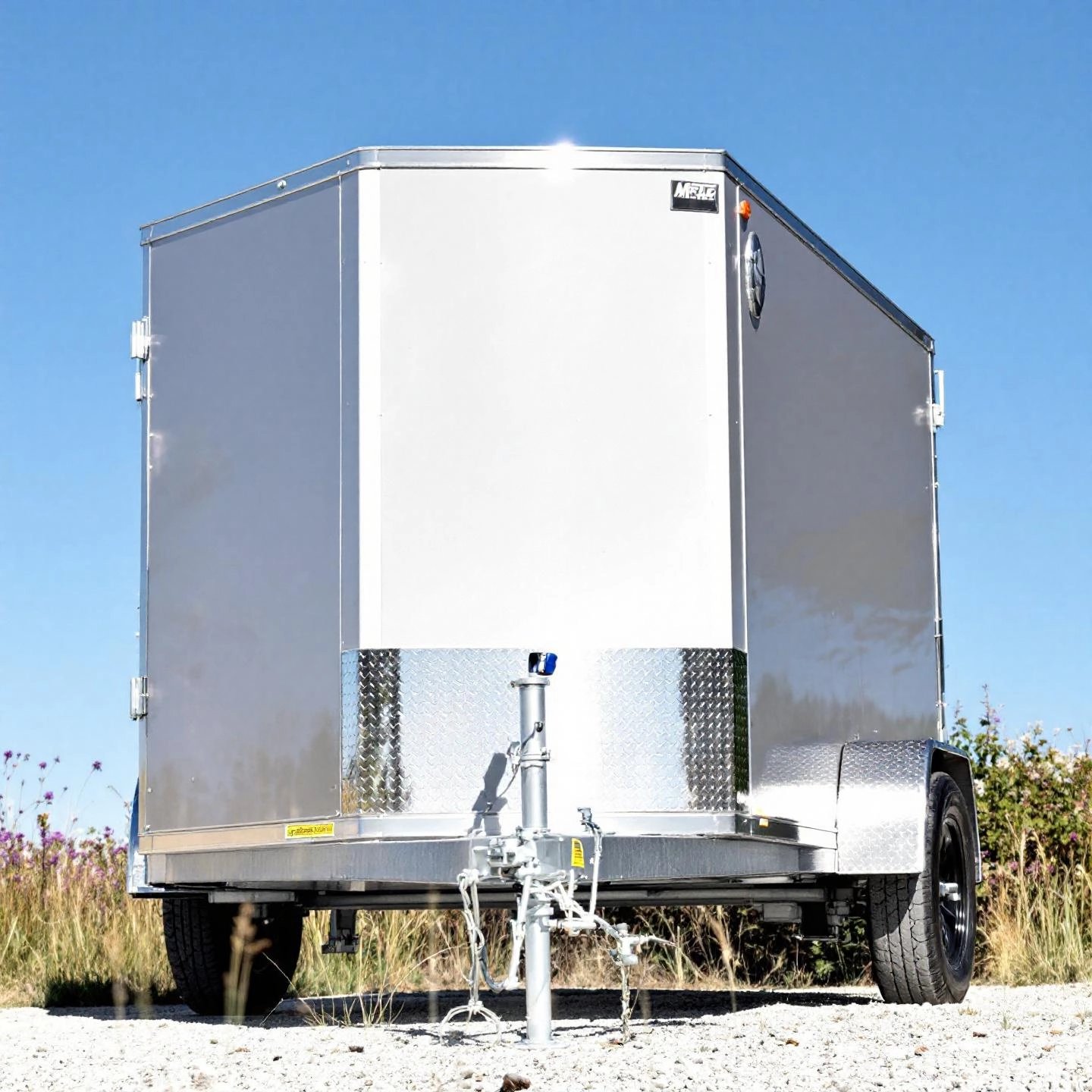
Have you ever needed to move heavy equipment, landscaping tools, or recreational gear—and wondered what’s the best trailer for the job? If so, you’re not alone. More and more individuals and businesses are turning to the aluminum utility trailer as their solution for reliable, efficient, and long-lasting hauling. But what makes these trailers stand out, and how do you choose the best aluminum utility trailer for your needs?
Imagine you’re planning a cross-country camping adventure, or maybe you run a landscaping business that depends on transporting equipment every day. In either case, you need a trailer that’s easy to tow, resists the elements, and offers years of dependable service. That’s where aluminum utility trailers shine—offering a blend of lightweight construction and rugged durability that’s hard to beat.
The popularity of aluminum utility trailers has soared in recent years, and for good reason. According to market research, the global demand for these trailers is growing rapidly, with the market expected to reach $1.5 billion in 2025 and continue expanding at a steady pace. This surge is driven by the need for trailers that are not only tough but also fuel-efficient and easy to maintain. Whether you’re hauling for work or play, the advantages of aluminum—such as corrosion resistance and reduced weight—are making these trailers the top pick for a wide range of users (source).
In this comprehensive buyer’s guide, we’ll walk you through everything you need to know to make an informed choice, including:
Whether you’re searching for a trailer to support your business or enhance your weekend adventures, this guide is designed to help you find a dependable, durable solution that fits your budget and lifestyle. Let’s dive in and discover why the aluminum utility trailer has become the gold standard for today’s hauling needs.
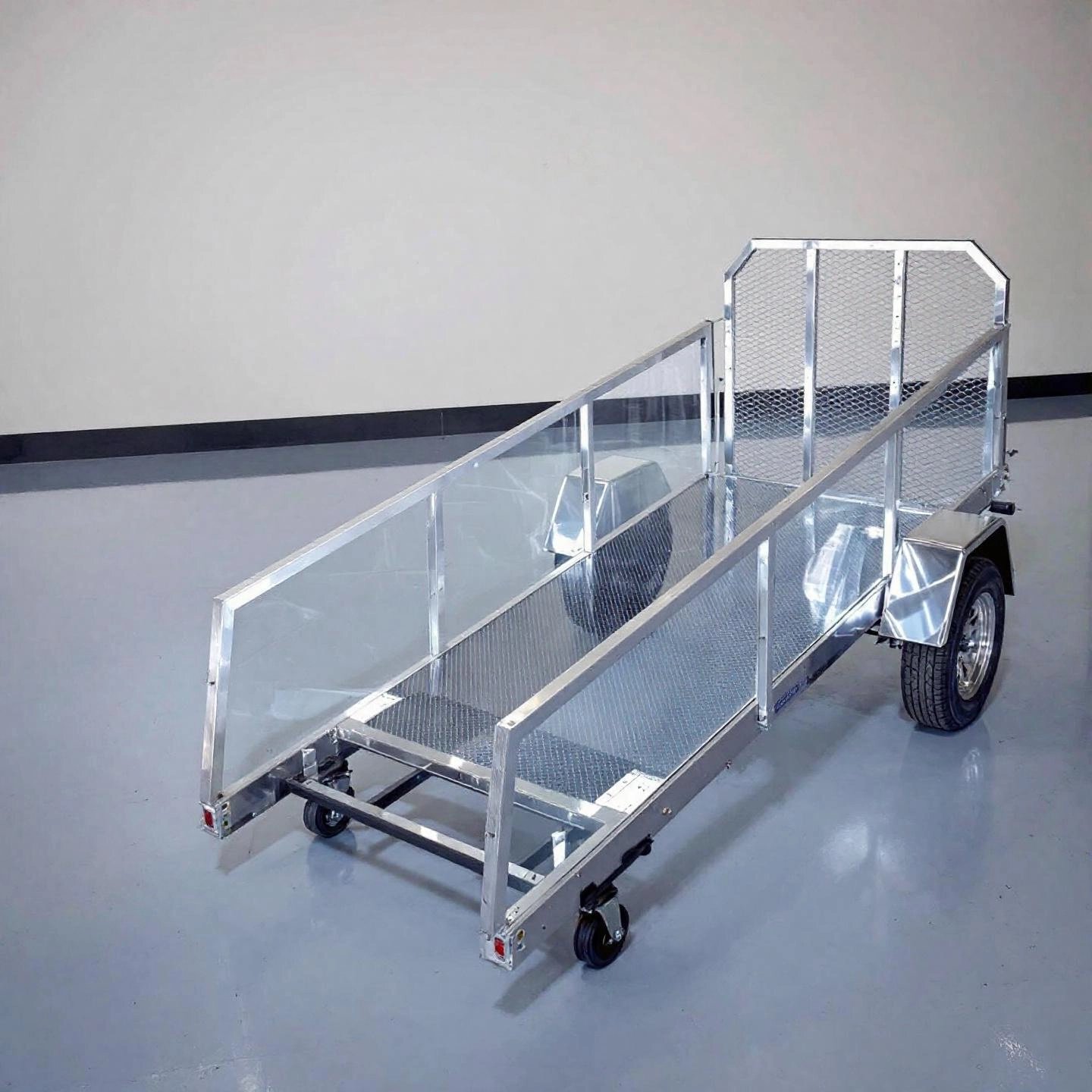
When you’re considering a new trailer, you might ask yourself: “What makes an aluminum utility trailer such a smart investment?” Picture this—you’re loading up for a weekend trip, or hauling landscaping equipment for your business. The last thing you want is a trailer that’s heavy, prone to rust, or costly to maintain. That’s where the aluminum utility trailer benefits truly shine. Let’s break down the key advantages that set these trailers apart, so you can decide if they’re the right fit for your hauling needs.
Still curious about how aluminum stands up in real-world use? Consider its widespread adoption in the transportation industry. From cars and trucks to airplanes and public transit, aluminum is prized for its high strength-to-weight ratio, corrosion resistance, and impact absorption. In fact, modern vehicles—from engine blocks to aircraft fuselages—rely on aluminum to deliver efficiency and longevity. This same technology and durability are found in today’s best aluminum utility trailers, ensuring you benefit from decades of innovation and proven performance. For a deeper dive into how aluminum is transforming transportation, check out this blog post.
When you add up these aluminum trailer advantages, it’s clear why more buyers are making the switch. Next, we’ll compare aluminum and steel head-to-head, so you can see exactly how each material stacks up for your unique hauling needs.
When you’re searching for the perfect trailer, you’re bound to ask: Should I choose aluminum or steel? If you’ve ever worried about towing capacity, maintenance headaches, or long-term value, you’re not alone. Let’s break down the aluminum utility trailer vs steel debate with clear facts, practical examples, and a side-by-side comparison to help you make the best choice for your hauling needs.
Imagine you’re loading up for a weekend getaway or a big landscaping job. The material of your trailer determines how much you can haul, how easy it is to tow, and how much time and money you’ll spend on upkeep. To make things simple, here’s a direct aluminum vs steel trailer comparison—so you can see the differences at a glance:
| Feature | Aluminum Utility Trailer | Steel Utility Trailer |
|---|---|---|
| Weight | Lighter (about 1/3 the density of steel); increases payload and improves fuel efficiency | Heavier; reduces payload and can strain smaller tow vehicles |
| Strength | High strength-to-weight ratio; ideal for lighter to moderate loads | Superior raw strength; best for heavy-duty loads and rough terrain |
| Corrosion Resistance | Excellent; forms a protective oxide layer and doesn’t rust | Poor unless treated; susceptible to rust and corrosion, especially if scratched |
| Maintenance | Low; minimal upkeep, no need for repainting or rust removal | Moderate to high; needs regular inspection, painting, and rust prevention |
| Initial Cost | Higher upfront price | Lower upfront price |
| Lifetime Cost | Lower over time due to less maintenance and higher resale value | Can be higher over time due to maintenance and depreciation |
| Appearance | Stays looking new longer; resists weathering | Prone to rust and fading; may look worn quickly |
| Repairability | Repairs can be more challenging (welding, dent removal) | Easier to repair; welding and patching are straightforward |
| Resale Value | Generally higher, thanks to durability and appearance | Often lower, especially if rust or damage is present |
Not all aluminum utility trailers are created equal. The quality of the aluminum profiles and the precision of the manufacturing process directly impact the trailer’s strength, longevity, and safety. That’s why leading trailer brands partner with trusted suppliers—like Shengxin Aluminum—who deliver advanced, high-integrity aluminum extrusions. Superior materials mean your trailer will resist fatigue, corrosion, and daily wear, ensuring your investment lasts for years to come.
Now that you have a clear picture of how aluminum and steel stack up, let’s dive into choosing the right trailer size—so you can match your next purchase perfectly to your unique hauling needs.
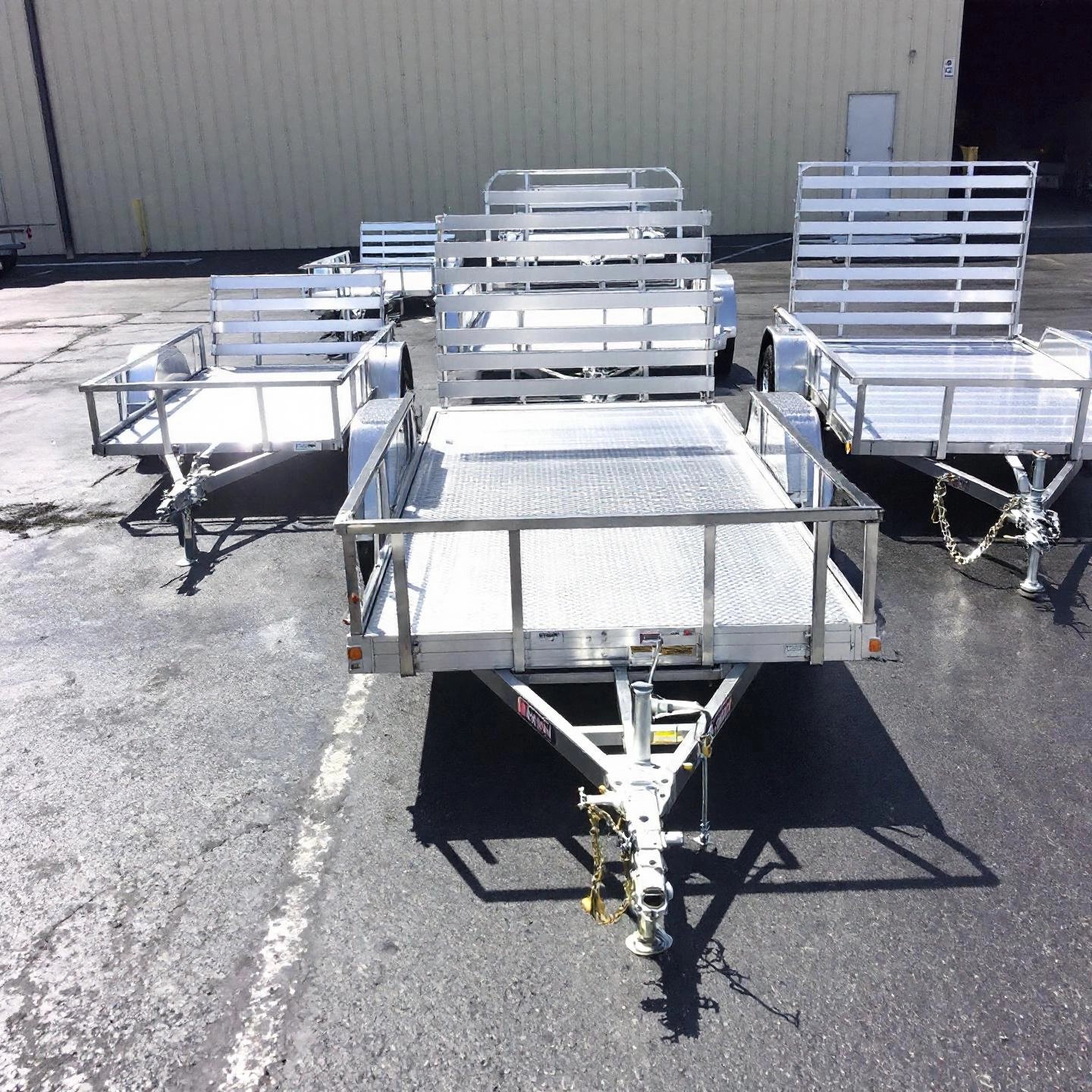
Ever stood in front of a row of trailers, all different sizes, and wondered, “Which one will actually fit my needs?” You’re not alone. Picking the right size aluminum utility trailer can feel overwhelming, but with a few practical steps and clear examples, you’ll be equipped to make a confident choice—whether you’re a weekend gardener, a contractor, or an outdoor enthusiast.
Let’s start with a simple question: What do you plan to haul most often? The answer is the key to narrowing down your options. The size and weight of your typical load—whether it’s a lawn mower, ATV, building materials, or furniture—should guide your decision. Here’s how to break it down:
Payload capacity is the maximum weight your trailer can safely carry—including cargo and any added gear. Overloading can lead to safety risks, increased wear, and even legal trouble. To find the right fit:
Not sure which dimensions to consider? Here’s a quick reference for the most common trailer sizes and what they’re best suited for:
“Selecting the right trailer size isn’t just about today’s needs—think about what you might need to haul next year, too.”
Choosing the correct aluminum utility trailer size is about matching your cargo, your tow vehicle, and your future plans. With your ideal size in mind, the next step is understanding axle configurations—so you can balance maneuverability, stability, and load capacity for every haul.
When you’re standing in front of a row of shiny new trailers, you might wonder: “Do I need a single axle aluminum utility trailer or a tandem axle aluminum utility trailer?” The answer depends on what you plan to haul, how far you’ll travel, and even where you’ll park. Let’s break down the differences so you can confidently select the right configuration for your hauling lifestyle.
Imagine you’re navigating tight city streets, backing into a small garage, or hauling lighter loads for weekend projects. That’s where a single axle trailer shines. Here’s what you need to know:
However, single axle trailers have their limits. They’re best for lighter loads—overloading can cause safety issues, increased tire wear, and may even violate state regulations if your trailer lacks brakes for heavier cargo.
Now, picture yourself hauling a load of construction materials across state lines, or transporting multiple ATVs for a weekend adventure. Here’s where a tandem axle trailer steps up:
Keep in mind, tandem axle trailers are heavier and more expensive up front. They require more space to maneuver and park, and maintenance costs can be higher due to the extra components. You’ll also need a tow vehicle with greater capacity to handle the increased weight.
| Feature | Single Axle | Tandem Axle |
|---|---|---|
| Maneuverability | High (easy to park & steer) | Lower (requires more space) |
| Payload Capacity | Lower (best for light loads) | Higher (suited for heavy loads) |
| Stability | Less stable at high speeds | Very stable, less sway |
| Initial Cost | Lower | Higher |
| Maintenance | Less (fewer parts) | More (extra tires & bearings) |
| Best For | Homeowners, small jobs | Contractors, heavy-duty use |
Still unsure? Consider your typical cargo, towing vehicle capacity, and where you’ll most often use your trailer. The right axle configuration will make every haul safer, easier, and more efficient. Next, we’ll explore what sets high-quality trailer brands apart—so you’ll know what to look for when you’re ready to buy.
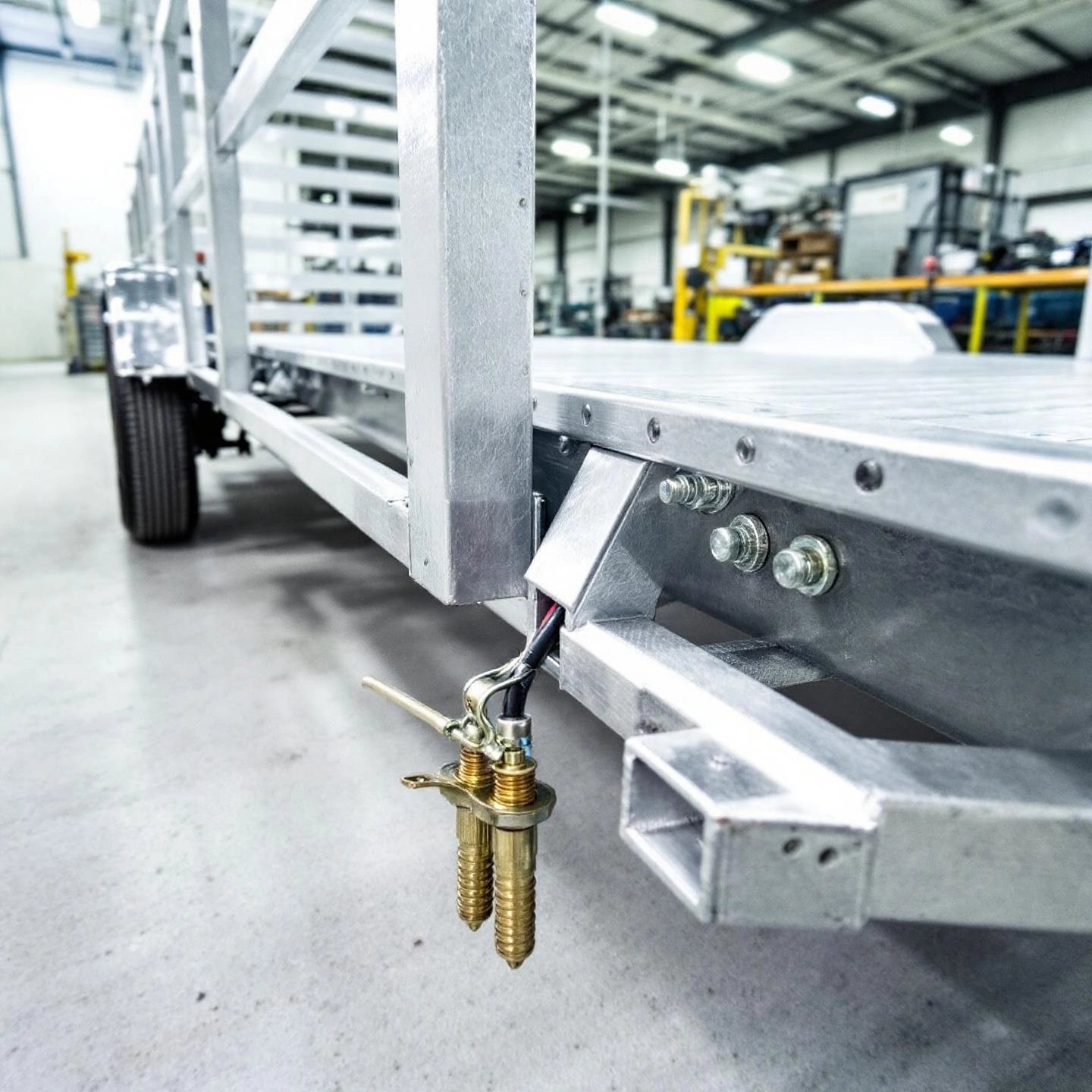
Ever wondered why some aluminum utility trailers last for decades while others struggle after a few seasons? Imagine you’re shopping for a trailer—two options look similar at first glance, but only one will deliver years of worry-free hauling. What’s the difference? Let’s break down the key features that define a high quality aluminum utility trailer and spotlight what makes the best aluminum utility trailer brands stand out in a crowded market.
When you’re investing in an aluminum utility trailer, it’s not just about the price tag or shiny finish. The real value lies in the details—those features and construction techniques that ensure safety, performance, and longevity. Here’s what to look for:
Some brands consistently rise to the top thanks to their commitment to quality, innovation, and customer satisfaction. Let’s look at what sets them apart:
Here’s a detail many buyers overlook: the strength and reliability of an aluminum utility trailer start with the raw materials. Top brands often partner with expert aluminum extrusion providers—like Shengxin Aluminum—whose advanced production capabilities ensure every trailer frame and component meets strict standards for strength, consistency, and corrosion resistance. These partnerships mean your trailer benefits from the latest innovations in aluminum technology, resulting in a product that’s lighter, stronger, and built for the long haul.
“A high quality aluminum utility trailer is only as good as the materials and craftsmanship behind it. Don’t settle for less—look for brands that invest in premium aluminum extrusions and proven manufacturing expertise.”
As you evaluate your options, keep these features and brand characteristics in mind. Up next, we’ll share a practical guide to buying new or used trailers—so you can spot quality, ask the right questions, and make a purchase you’ll be proud of for years to come.
When you spot an aluminum utility trailer for sale—whether brand new or used—how do you know if it’s a smart buy? Maybe you’re picturing yourself hauling weekend project materials or gearing up for a busy landscaping season. The options can feel overwhelming, especially with so many listings and price points. Let’s break down exactly what to look for, what to ask, and how to protect your investment—so you can buy with confidence and avoid costly surprises.
Imagine arriving to check out a trailer, only to discover hidden damage or expensive repairs lurking beneath the surface. Sounds stressful? With the right inspection checklist, you’ll spot red flags early and ensure your trailer is road-ready. Here’s what to check, whether you’re considering a new or used aluminum utility trailer:
| Component | What to Look For |
|---|---|
| Tires | Inspect for cracks, plugs, mismatched sizes, and tread wear. Tires should match in size and be rated for your intended load. Replacing tires can be costly if overlooked. |
| Brakes | Ask about brake function. If possible, inspect pads, drums, rotors, and magnets for wear or damage. |
| Wheel Bearings | Check for proper lubrication and seating. Worn or dry bearings can lead to expensive repairs. |
| Frame & Welds | Look for cracks, repairs, or rust (on non-aluminum parts). A compromised frame can signal overloading or poor construction. |
| Axles & Suspension | Inspect leaf springs, hangers, and axles for cracks, bends, or signs of impact. Uneven axles cause tire wear and unsafe towing. |
| Lighting & Wiring | Test all lights. Non-working lights may indicate simple fixes or costly wiring issues. |
| Flooring | Check for rot, warping, or loose boards. Replacing floors involves time and money. |
| Ramps & Gates | Ensure ramps are straight, strong, and free of cracks. Test hinges and latches for smooth operation. |
| VIN & Registration | Verify the VIN is present and matches paperwork. Confirm registration and title are in order to avoid legal headaches. |
Don’t be shy—asking the right questions can reveal a lot about a trailer’s condition and history. Before you commit to any aluminum utility trailer for sale, consider these:
For used aluminum utility trailers, always ask to see the trailer hitched and in motion, if possible. Listen for unusual noises and observe how it tows and brakes.
Imagine buying a trailer—only to find out later it was stolen or lacks a proper title. To avoid trouble, keep these paperwork tips in mind:
Still debating between new and used? While a new trailer offers the latest features and peace of mind, a used trailer can be a budget-friendly option—if you’re thorough with your inspection. Just remember, sometimes used trailers require repairs that can quickly eat into your savings. If the price of a used trailer is close to new, consider the added value of a warranty and customization options that come with buying new.
“A careful inspection and proper paperwork are your best insurance against unexpected costs when buying an aluminum utility trailer for sale.”
Armed with these tips, you’re ready to shop smarter—whether you’re browsing local dealers or online listings. Next, let’s explore how to find the best trailers in your area and what to watch for when shopping locally.
Ever typed “aluminum utility trailer near me” into a search bar and felt overwhelmed by the sheer number of options? If so, you’re not alone. Whether you’re planning a big landscaping project or need reliable transport for your business, finding the right trailer locally can save you both time and hassle. But where should you look, and how do you separate the best deals from the duds? Let’s break down the smartest ways to find an aluminum utility trailer in your area, including what to watch for before you buy.
When you’re ready to start shopping, you’ll notice there’s no shortage of places offering trailers. Here’s a quick rundown of the most common sources—and what each brings to the table:
Not all listings are created equal. Before you get too excited about a great price or slick photos, take these steps to protect yourself:
Imagine finding what looks like the perfect trailer online—only to discover hidden issues when you see it in person. That’s why an in-person inspection is so important. Before committing to a purchase, always:
If you’re not confident in your ability to spot issues, consider bringing a knowledgeable friend or even hiring a local mechanic for a quick inspection. Remember, a thorough check now can save you from headaches and unexpected costs later (reference).
Finding a quality aluminum utility trailer near you doesn’t have to be stressful. By exploring multiple sources, vetting listings and sellers, and insisting on an in-person inspection, you’ll ensure your investment is both safe and worthwhile. Ready to take the next step? Once you’ve found the right trailer, it’s time to balance cost and features—so you get the best value for years to come.
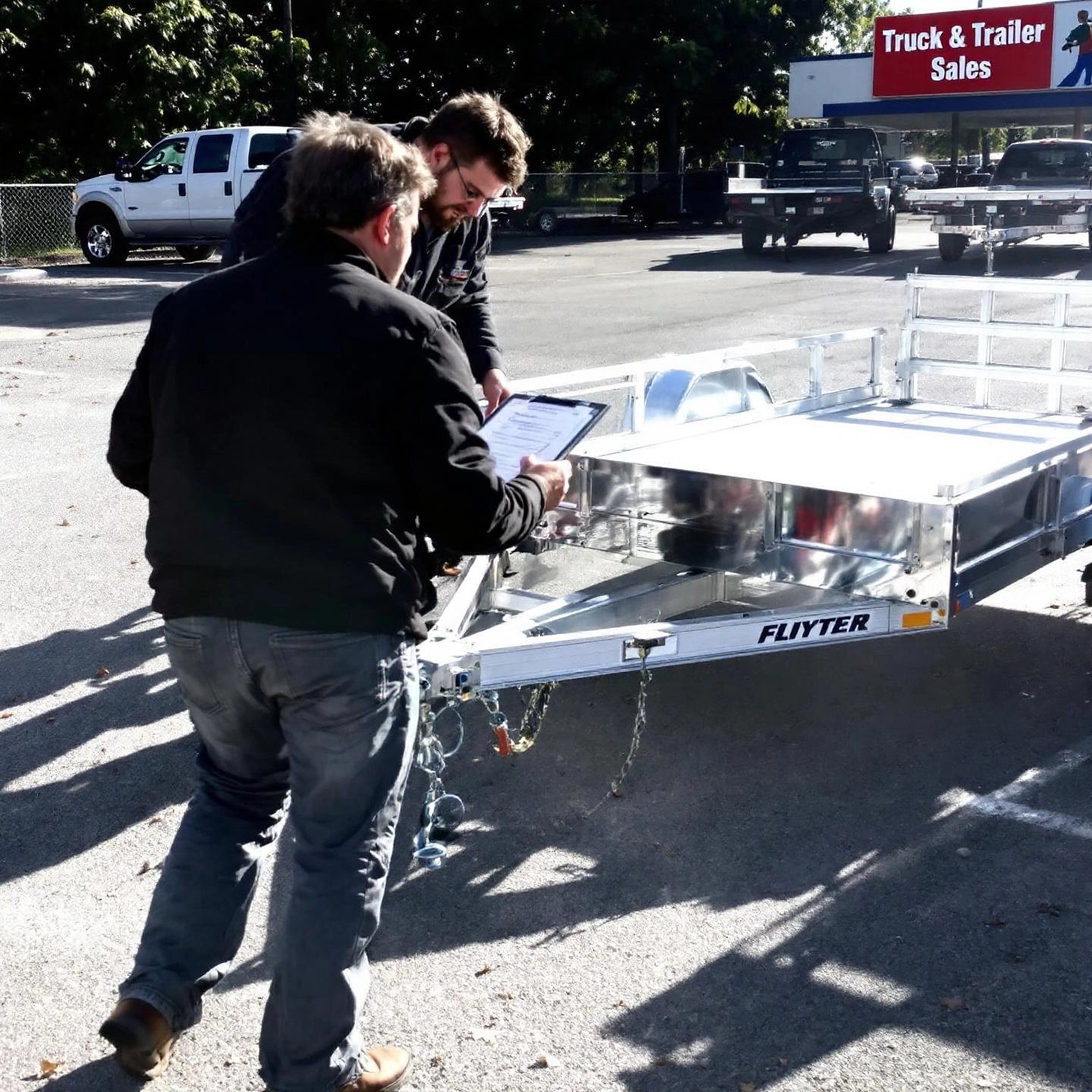
When shopping for a new trailer, it’s easy to focus on the sticker price. But what if the aluminum utility trailer price is only one part of the equation? Imagine two buyers: one chooses the lowest upfront cost, while the other invests a bit more for a trailer designed to last. Fast forward a few years—who has the better deal? Let’s break down how to weigh costs and features so you get the best aluminum trailer value for the long haul.
Have you ever asked, “Why do aluminum trailers cost more than steel?” The answer lies in what you save over time. While aluminum trailers often have a higher initial price, the long-term savings can be substantial. Here’s why:
Sounds complex? Here’s a simple approach: focus on features that add true value to your hauling experience, and be wary of paying extra for add-ons you’ll rarely use. Ask yourself:
| Cost Factor | Steel Utility Trailer | Aluminum Utility Trailer |
|---|---|---|
| Initial Price | Lower | Higher |
| Annual Maintenance | High (due to rust, repainting, repairs) | Low (minimal upkeep) |
| Fuel Economy | Lower (heavier weight) | Higher (lighter weight) |
| Resale Value | Lower (rust and wear reduce price) | Higher (holds value, less visible wear) |
As you can see, the initial savings on a steel trailer can be quickly offset by higher maintenance costs and lower resale value. In contrast, aluminum trailers deliver better total value—even if the upfront price is higher.
Choosing an aluminum utility trailer is about more than just price—it’s about making a smart investment that will serve you well for years. By focusing on long-term value, essential features, and low maintenance, you’ll get the most out of every dollar spent. Ready to wrap up your search? Let’s recap the key takeaways and help you make a confident final decision.
When you look back at your search for the perfect trailer, what stands out? Maybe it’s the promise of lighter towing, freedom from rust, or knowing your investment will hold its value for years. Throughout this guide, we’ve explored every angle of the aluminum utility trailer investment—from why aluminum is the material of choice to how to spot a truly durable aluminum utility trailer that will serve you reliably, mile after mile.
Imagine the confidence you’ll feel knowing you’ve chosen a trailer that’s light to tow, tough against the elements, and built to last—because you did your homework. Use this guide as your roadmap to a smarter purchase, one that meets your needs today and adapts as those needs grow.
One final tip: The backbone of every durable aluminum utility trailer is the quality of its aluminum profiles. Leading manufacturers partner with trusted suppliers like Shengxin Aluminum, whose advanced extrusion and finishing processes ensure every trailer frame delivers top-tier strength, consistency, and corrosion resistance. Choosing a trailer built with premium materials isn’t just about longevity—it’s about protecting your investment and your peace of mind for years to come.
Ready to make your move? With the knowledge you’ve gained here, you’re set to find an aluminum utility trailer that delivers maximum value, reliability, and satisfaction—no matter where the road takes you.
Aluminum utility trailers are a worthwhile investment for most users due to their lighter weight, strong corrosion resistance, and minimal maintenance needs. These features reduce towing strain and long-term costs, while their durability ensures a higher resale value compared to steel trailers. For both personal and professional hauling, aluminum offers excellent long-term value and reliability.
The main downsides of aluminum trailers are their higher initial purchase price and, in some cases, slightly lower strength for extremely heavy-duty applications compared to steel. However, the reduced maintenance, better fuel efficiency, and higher resale value often offset the upfront cost for most users. For very heavy loads or rough terrain, steel may be preferable, but for most everyday hauling, aluminum is the better choice.
With proper care, aluminum utility trailers can last 10 to 20 years or more. Their natural resistance to rust and corrosion helps them maintain structural integrity and appearance over time. Routine cleaning and basic inspections are usually sufficient to keep them in top condition, making them a durable option for long-term use.
When buying an aluminum utility trailer, check weld quality, protected wiring, and premium components such as axles and couplers. Inspect for signs of damage, ensure the trailer matches your payload needs, and verify paperwork like the VIN and title. Choosing trailers made with high-quality aluminum from reputable suppliers, such as Shengxin Aluminum, ensures superior strength and longevity.
You can find quality aluminum utility trailers at authorized trailer dealers, farm and equipment stores, and online marketplaces. Always vet listings and sellers, check reviews, and insist on an in-person inspection before purchasing. This approach helps ensure you get a reliable trailer that fits your needs and budget.
 خدمة الإنترنت
خدمة الإنترنت 0086 136 3563 2360
0086 136 3563 2360 sales@sxalu.com
sales@sxalu.com +86 136 3563 2360
+86 136 3563 2360